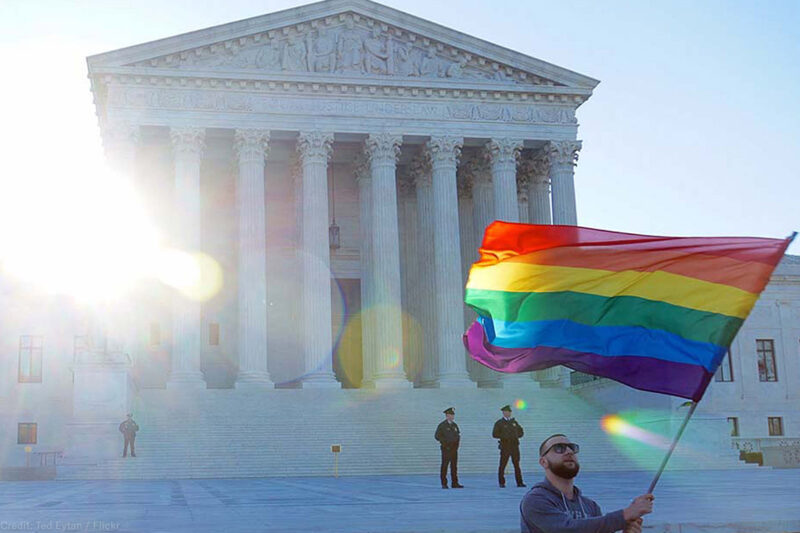
On Wednesday, the Equality Act — legislation that would provide LGBTQ people with explicit and comprehensive nondiscrimination protections — was introduced in the U.S. Senate and House of Representatives with the support of nearly 300 members of Congress. If passed, it would transform the civil rights landscape in the United States.
The harsh reality — despite increasing support among the public and representation in popular culture — is that discrimination remains a persistent problem for LGBTQ people across the country. From discrimination and harassment of LGBTQ youth in our nation’s schools to older same-sex couples who are denied housing in retirement communities because of their sexual orientation, this is something that LGBTQ people confront throughout our lives and in every corner of the country.
These include people like our client Aimee Stephens who was fired from her job at a funeral home after she came out as a woman, just because she’s transgender. Or Mary Walsh and Beverly Nance who were at a retirement community because they’re lesbians. Or Jack Zawadski who was told by a funeral home that they don’t “deal with [your] kind” when it out of a nursing home after he died.
This is why the Equality Act is so critically important. It would provide LGBTQ people with consistent, explicit, and nationwide nondiscrimination protections across all of the key areas of daily life, including employment, housing, and access to public spaces and services. It would do this by explicitly prohibiting discrimination based on sexual orientation and gender identity in our nation’s federal civil rights laws — giving LGBTQ people the same protections that exist for other characteristics under federal law, such as race, religion, and national origin.
The Equality Act also fills significant gaps in our federal civil rights laws for women, people of color, and for everyone who is protected under the law. It makes sure all businesses, including retail establishments and transportation providers, are covered under laws that bar discrimination by businesses open to the public. This is something that is particularly important for people of color given the significant discrimination faced by Black and brown people in these spaces.
For the first time under federal law, it would be illegal to discriminate against individuals for “” and “.” It would also significantly expand protections from sex discrimination by banning discrimination in businesses open to the public and in federally funded programs. With this expansion, the routine practice of mechanics charging women more than men for the same car services would be illegal under federal law.
And with the Trump administration and anti-LGBTQ activists doing everything they can to turn religious liberty into a license to discriminate, it’s important that the Equality Act also clarifies that the Religious Freedom Restoration Act — which has been misused to license discrimination under the guise of “religious liberty” — can’t undercut civil rights protections for anyone.
At the end of the day, all of us should be able to fully participate in public life and not be judged based on characteristics like our sexual orientation or gender identity. Everyone deserves a fair chance to support themselves, provide for their family, and live as their true selves free from the fear of harassment or discrimination. This is the goal of the Equality Act.
This year, we mark the 50th anniversary of the uprising at Stonewall, an event which gave rise to the modern LGBTQ movement. There is no better way to honor the decades-long struggle for dignity and equality for LGBTQ people than for our elected leaders in Congress to pass this legislation. It has been a long time coming.

